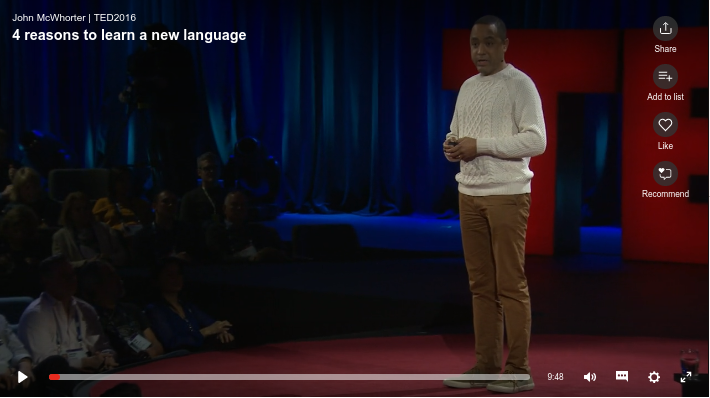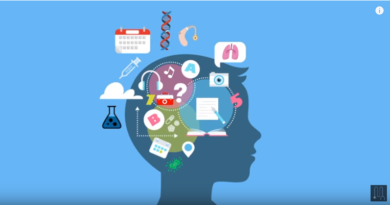Palestra ministrada por John McWorther, no TED 2016. John McWorther é um linguista e professor da Universidade de Columbia, em Nova Iorque.
Descrição
O inglês está se tornando muito rapidamente o idioma universal e as tecnologias de tradução instantânea estão cada vez melhores. Neste contexto, porque devemos nos preocupar em aprender um novo idioma? Nesta palestra são apresentadas quatro razões sedutoras dos benefícios de aprender um idioma desconhecido.
Assistir a palestra
| English Transcript | Portuguese Translation |
|---|---|
| The language I'm speaking right now is on its way to becoming the world's universal language, for better or for worse. Let's face it, it's the language of the internet, it's the language of finance, it's the language of air traffic control, of popular music, diplomacy -- English is everywhere. | O idioma que falo neste momento está no caminho de se tornar o idioma universal do mundo, para o bem ou para o mal. Vamos encarar, é o idioma da internet, é o idioma das finanças, é o idioma do controle de tráfego aéreo, da música popular, diplomacia. O inglês está em todo lugar. |
| Now, Mandarin Chinese is spoken by more people, but more Chinese people are learning English than English speakers are learning Chinese. Last I heard, there are two dozen universities in China right now teaching all in English. English is taking over. | O mandarim é falado por mais pessoas, mas mais chineses estão aprendendo inglês do que falantes de inglês aprendem chinês. Pelo que soube, há dezenas de universidades hoje, na China, ensinando tudo em inglês. O inglês está dominando. |
| And in addition to that, it's been predicted that at the end of the century almost all of the languages that exist now -- there are about 6,000 -- will no longer be spoken. There will only be some hundreds left. And on top of that, it's at the point where instant translation of live speech is not only possible, but it gets better every year. | E, mais do que isso, já foi previsto que, no fim do século, quase todas as línguas que existem hoje, existem cerca de 6 mil, não serão mais usadas. Restarão apenas algumas centenas. E, além disso, estamos num ponto em que tradução simultânea não só é possível, como tem melhorado a cada ano. |
| The reason I'm reciting those things to you is because I can tell that we're getting to the point where a question is going to start being asked, which is: Why should we learn foreign languages -- other than if English happens to be foreign to one? Why bother to learn another one when it's getting to the point where almost everybody in the world will be able to communicate in one? | A razão pela qual digo isso a vocês é porque sei que estamos chegando num ponto em que uma questão será levantada, que é: por que devemos aprender línguas estrangeiras, exceto quando o inglês for um idioma estrangeiro para alguém? Por que aprender outro quando se está chegando ao ponto em que quase todos no mundo serão capazes de se comunicar com um único? |
| I think there are a lot of reasons, but I first want to address the one that you're probably most likely to have heard of, because actually it's more dangerous than you might think. And that is the idea that a language channels your thoughts, that the vocabulary and the grammar of different languages gives everybody a different kind of acid trip, so to speak. That is a marvelously enticing idea, but it's kind of fraught. | Eu acho que existem muitas razões, mas, antes, quero tratar de uma sobre a qual muitos de vocês já devem ter ouvido, porque é mais perigosa do que pensam: é a ideia de que uma língua guia seus pensamentos, de que o vocabulário e a gramática de diferentes idiomas dão a todos uma sensação diferente de viagem, por assim dizer. Essa é uma ideia maravilhosamente sedutora, mas um pouco exagerada. |
| So it's not that it's untrue completely. So for example, in French and Spanish the word for table is, for some reason, marked as feminine. So, "la table," "la mesa," you just have to deal with it. It has been shown that if you are a speaker of one of those languages and you happen to be asked how you would imagine a table talking, then much more often than could possibly be an accident, a French or a Spanish speaker says that the table would talk with a high and feminine voice. So if you're French or Spanish, to you, a table is kind of a girl, as opposed to if you are an English speaker. | Não que seja completamente mentira. Por exemplo, em francês e em espanhol, a palavra para mesa é, por alguma razão, feminina. Então, "la table", "la mesa", temos que lidar com isso. E já foi revelado que se você é falante de um desses idiomas e alguém lhe pergunta como você imaginaria uma mesa falando, muito mais provável seria do que ao acaso, um falante de francês ou espanhol diria que a mesa falaria com uma voz aguda e feminina. Então, se você é francês ou espanhol, para você, "mesa" é como uma menina, mas não para você, falante de inglês. |
| It's hard not to love data like that, and many people will tell you that that means that there's a worldview that you have if you speak one of those languages. But you have to watch out, because imagine if somebody put us under the microscope, the us being those of us who speak English natively. What is the worldview from English? | É difícil não amar esse tipo de dado, e muita gente dirá que isso significa que é a visão mundial que se tem quando se fala uma dessas línguas. Mas temos que ter cuidado, pois imaginem se alguém nos analisar a fundo, refiro-me a nós, falantes nativos de inglês. Qual é a visão mundial a partir da língua inglesa? |
| So for example, let's take an English speaker. Up on the screen, that is Bono. He speaks English. I presume he has a worldview. Now, that is Donald Trump. In his way, he speaks English as well. | Por exemplo, vamos pegar um falante de inglês. Na tela, vemos o Bono. Ele fala inglês. Eu presumo que ele tenha uma visão do mundo. Agora, esse é Donald Trump. Ao seu modo, ele também fala inglês. (Risos) |
| And here is Ms. Kardashian, and she is an English speaker, too. So here are three speakers of the English language. What worldview do those three people have in common? What worldview is shaped through the English language that unites them? It's a highly fraught concept. And so gradual consensus is becoming that language can shape thought, but it tends to be in rather darling, obscure psychological flutters. It's not a matter of giving you a different pair of glasses on the world. | E aqui está a Sra. Kardashian e ela fala inglês também. Então aqui estão três falantes da língua inglesa. 03:39 Qual visão do mundo essas três pessoas têm em comum? Que visão mundial é moldada pelo idioma que os une? É um conceito altamente inquietante. E, então, torna-se um consenso gradual que um idioma pode moldar o pensamento, mas tende a ser mais uma vibração charmosa, obscura e psicológica. Não é uma questão de nos dar óculos diferentes para ver o mundo. |
| Now, if that's the case, then why learn languages? If it isn't going to change the way you think, what would the other reasons be? There are some. One of them is that if you want to imbibe a culture, if you want to drink it in, if you want to become part of it, then whether or not the language channels the culture -- and that seems doubtful -- if you want to imbibe the culture, you have to control to some degree the language that the culture happens to be conducted in. There's no other way. | Agora, se esse é o caso, então por que aprender idiomas? Se isso não vai mudar o jeito como você pensa, quais seriam as outras razões? Existem algumas. Uma delas é que, se você quer assimilar uma cultura, se você quer se embriagar dela, se quer se tornar parte dela, então se o idioma serve ou não como meio para a cultura, e isso parece duvidoso, se você quer assimilar da cultura, você tem que dominar, em algum nível, o idioma que pertence a essa cultura. Não há outro jeito. |
| There's an interesting illustration of this. I have to go slightly obscure, but really you should seek it out. There's a movie by the Canadian film director Denys Arcand -- read out in English on the page, "Dennis Ar-cand," if you want to look him up. He did a film called "Jesus of Montreal." And many of the characters are vibrant, funny, passionate, interesting French-Canadian, French-speaking women. There's one scene closest to the end, where they have to take a friend to an Anglophone hospital. In the hospital, they have to speak English. | Há uma ilustração interessante para esse ponto. Tenho que ser um pouco obscuro, mas vocês deveriam procurar: existe um filme, do diretor canadense Denys Arcand, que em inglês é pronunciado "Dennis Ar-cand", se quiserem procurá-lo. Ele fez um filme chamado "Jesus de Montreal". E muitos de seus personagens são mulheres franco-canadenses vibrantes, engraçadas, apaixonadas, interessantes, que falam francês. Há uma cena perto do final em que elas têm que levar uma amiga a um hospital onde se fala inglês. |
| Now, they speak English but it's not their native language, they'd rather not speak English. And they speak it more slowly, they have accents, they're not idiomatic. Suddenly these characters that you've fallen in love with become husks of themselves, they're shadows of themselves. | Lá, elas têm que falar inglês. Elas falam inglês, mas essa não é sua língua nativa, elas preferem não falar inglês. E elas falam mais devagar, elas têm sotaque, não são idiomáticas. De repente, essas personagens por quem nos apaixonamos tornam-se superficialidades delas mesmas, elas são sombras delas mesmas. |
| To go into a culture and to only ever process people through that kind of skrim curtain is to never truly get the culture. And so to the extent that hundreds of languages will be left, one reason to learn them is because they are tickets to being able to participate in the culture of the people who speak them, just by virtue of the fact that it is their code. So that's one reason. | Entrar numa cultura e somente examinar pessoas através daquela cortina transparente significa nunca entender realmente a cultura. E, para a extensão das centenas de línguas que restarão, uma razão para aprendê-las é que elas são como ingressos para que se possa participar da cultura das pessoas que as falam, somente pelo fato de que esse é o código delas. Então, esta é uma razão. |
| Second reason: it's been shown that if you speak two languages, dementia is less likely to set in, and that you are probably a better multitasker. And these are factors that set in early, and so that ought to give you some sense of when to give junior or juniorette lessons in another language. Bilingualism is healthy. | Segunda razão: já foi mostrado que se você fala dois idiomas, é menos provável que tenha demência, e que você provavelmente é um melhor multitarefas. E estes são fatores estabelecidos cedo, e devem nos dar uma direção sobre quando dar lições aos jovens estudantes em outro idioma. Bilinguismo é saudável. |
| And then, third -- languages are just an awful lot of fun. Much more fun than we're often told. So for example, Arabic: "kataba," he wrote, "yaktubu," he writes, she writes. "Uktub," write, in the imperative. What do those things have in common? All those things have in common the consonants sitting in the middle like pillars. They stay still, and the vowels dance around the consonants. Who wouldn't want to roll that around in their mouths? You can get that from Hebrew, you can get that from Ethiopia's main language, Amharic. That's fun. | E, então, terceiro: idiomas são uma grande diversão. Muito mais do que nos dizem. Por exemplo, em árabe, "kataba": ele escreveu. "Yaktubu": ele escreve, ela escreve. "Uktub": escreva, no imperativo. O que essas palavras têm em comum? Todas essas palavras têm em comum as consoantes situadas no meio, como pilares. Elas permanecem paradas, e as vogais dançam ao redor das consoantes. Quem não gostaria de rolar isso pela boca? Conseguimos fazer isso com o hebraico, com o principal idioma da Etiópia, o amárico. Isso é divertido. |
| Or languages have different word orders. Learning how to speak with different word order is like driving on the different side of a street if you go to certain country, or the feeling that you get when you put Witch Hazel around your eyes and you feel the tingle. A language can do that to you. | Ou idiomas que têm uma ordem diferente de palavras. Aprender a falar com uma ordem diferente de palavras é como dirigir no lado diferente de uma rua se vamos a certos países, ou o sensação de quando colocarmos hamamelis ao redor dos olhos e sentimos formigar. Um idioma pode fazer isso com você. |
| So for example, "The Cat in the Hat Comes Back," a book that I'm sure we all often return to, like "Moby Dick." One phrase in it is, "Do you know where I found him? Do you know where he was? He was eating cake in the tub, Yes he was!" Fine. Now, if you learn that in Mandarin Chinese, then you have to master, "You can know, I did where him find? He was tub inside gorging cake, No mistake gorging chewing!" That just feels good. Imagine being able to do that for years and years at a time. | Então, por exemplo, "The Cat in the Hat Comes Back", um livro para o qual sei que nos voltamos sempre, como "Moby Dick". Uma frase nele diz: "Você sabe onde o achei? Você sabe onde ele estava? Estava comendo bolo na banheira. Estava sim!" Ótimo. Agora, se você aprender isso em mandarim, você tem que dominar "Você pode saber eu onde o achei? Ele estava na banheira dentro devorando bolo, Sem erro devorando mastigando!" Isso parece certo. Imagine ser capaz de fazer isso por anos e anos. |
| Or, have you ever learned any Cambodian? Me either, but if I did, I would get to roll around in my mouth not some baker's dozen of vowels like English has, but a good 30 different vowels scooching and oozing around in the Cambodian mouth like bees in a hive. That is what a language can get you. | Ou, você já aprendeu cambojano? Eu também não, mas se aprendesse, eu teria que buscar em minha boca não apenas algumas dezenas de vogais, como no inglês, mas umas boas 30 vogais diferentes movendo-se e fluindo pela boca cambojana como abelhas numa colmeia. Isso é o que um idioma pode nos dar. |
| And more to the point, we live in an era when it's never been easier to teach yourself another language. It used to be that you had to go to a classroom, and there would be some diligent teacher -- some genius teacher in there -- but that person was only in there at certain times and you had to go then, and then was not most times. You had to go to class. If you didn't have that, you had something called a record. I cut my teeth on those. There was only so much data on a record, or a cassette, or even that antique object known as a CD. Other than that you had books that didn't work, that's just the way it was. | E, mais ao ponto, nós vivemos numa era em que nunca foi tão fácil aprender outro idioma sozinho. Antes, você entrava numa classe, e lá havia um professor diligente, um professor genial, mas aquela pessoa só estava presente algumas vezes e você tinha que ir, e não era a maior parte do tempo. Você tinha que ir à aula. Se você não tinha isso, você tinha um vinil. Eu os conheci. Havia muita informação num vinil, ou numa fita cassete, ou mesmo num objeto antigo conhecido como CD. Além disso, havia livros que não funcionavam. Era desse jeito. |
| Today you can lay down -- lie on your living room floor, sipping bourbon, and teach yourself any language that you want to with wonderful sets such as Rosetta Stone. I highly recommend the lesser known Glossika as well. You can do it any time, therefore you can do it more and better. You can give yourself your morning pleasures in various languages. I take some "Dilbert" in various languages every single morning; it can increase your skills. Couldn't have done it 20 years ago when the idea of having any language you wanted in your pocket, coming from your phone, would have sounded like science fiction to very sophisticated people. | Hoje, você pode se deitar, repousar no chão da sua sala, tomando um uísque, e aprender qualquer idioma que você queira com módulos maravilhosos, como os do Rosetta Stone. E eu também recomendo o Glossika, que é menos conhecido. Podemos fazer isso a qualquer hora. Portanto, conseguimos fazer mais e melhor. Podemos fazer nossa rotina matinal em várias línguas. Todas as manhãs, eu leio "Dilbert" em várias línguas, isso aumenta nossas habilidades. Não conseguiria fazer isso há 20 anos, quando a ideia de ter qualquer idioma que você quisesse na palma da mão, vindo do seu telefone, pareceria ficção científica mesmo para pessoas sofisticadas. |
| So I highly recommend that you teach yourself languages other than the one that I'm speaking, because there's never been a better time to do it. It's an awful lot of fun. It won't change your mind, but it will most certainly blow your mind. Thank you very much. | Então, eu recomento fortemente que você aprenda idiomas além desse que falo, porque nunca houve melhor momento para fazê-lo. É uma diversão incrível. Isso não vai fazê-lo mudar de ideia, mas vai, com certeza, deixá-lo maravilhado. Muito obrigado. |








